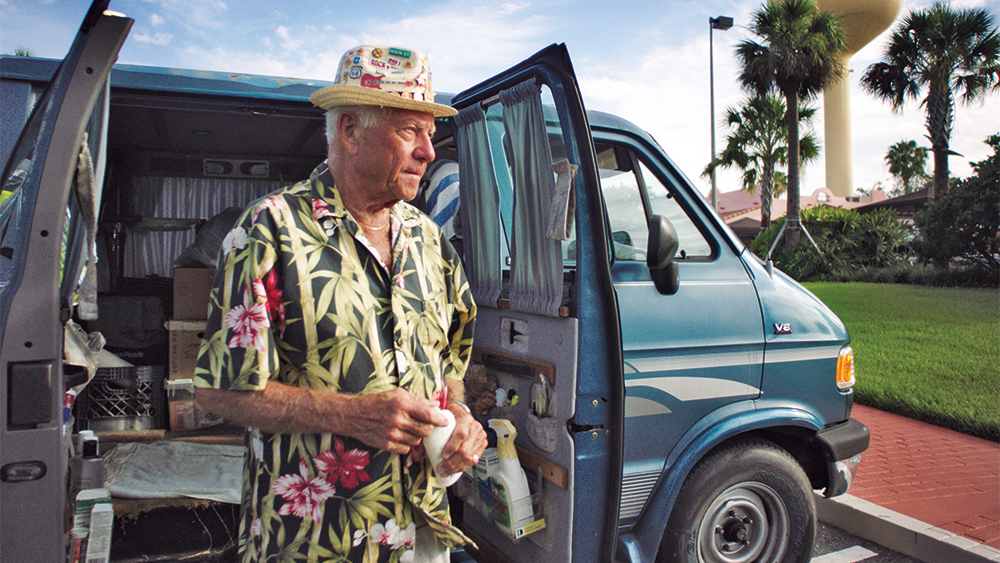Why the New York Times Is Getting Into the Documentary Films Business (EXCLUSIVE)
By Ramin Setoodeh
LOS ANGELES (Variety.com) – Lance Oppenheim didn’t set out to make an 83-minute documentary when he started chronicling a group of senior citizens living in a retirement community in central Florida. But after 18 months and hundreds of hours of footage, he began to see the outline of his first feature-length film, “Some Kind of Heaven,” which premieres this week at the Sundance Film Festival.
“I think the movie could have been so many different things,” says Oppenheim, who is 23 and has directed six short films. “I wanted to push the movie in a certain direction, away from the more informational. I wanted to make it something that was much more about how in life’s final chapters, things aren’t resolved.”
Instead of urging him to think tidier — and perhaps more commercially — one of the film’s producers, Kathleen Lingo, supported that vision. But she doesn’t work at a movie production company or a TV network. Instead, her office is in Times Square, in the home of the most prominent newspaper in the United States.
The New York Times is getting into the feature-length documentary business. As digital subscriptions have soared under the Trump administration, it’s been true for some time that the Times isn’t only a newspaper. “The Daily,” a podcast hosted by Michael Barbaro, reaches more than 2 million listeners a day with its analysis of the latest White House scandals. “The Weekly,” an FX docuseries, invites viewers to tag along with Times reporters on investigations or the editorial board during its presidential endorsement process . And romantic comedy fans can’t get enough of “Modern Love,” a scripted Amazon anthology series based on the popular column about fleeting romances and missed connections (it was recently renewed for a second season).
At Sundance, the Times will be debuting its first two feature-length documentaries. In addition to “Some Kind of Heaven,” the venerable journalism brand has “Time,” directed by Garrett Bradley, about a woman in Louisiana attempting to free her husband from a 60-year prison sentence. Neither of the docs playing at Sundance will be available on the Times website. Instead, they are seeking distribution, so that they can play to audiences in movies theaters or on a streaming platform. And more filmmakers are being recruited for upcoming documentaries, including one in development with an Oscar-nominated director based on reporting from an overseas correspondent.
“We are looking for ambitious journalistic projects told with a certain style,” says Sam Dolnick, the assistant managing editor at the Times who oversees audio, films and TV. “We’re not as drawn to talking-head kind of documentaries. We’re doing some documentaries that are pretty newsy and some that are not at all, just kind of delightful portraits of a slice of the world.”
It makes sense because documentary films are as popular as ever, coveted by almost every entertainment company from HBO to Netflix to Focus Features. The Times began exploring the space in 2011, when it launched its successful, and ongoing, Op-Docs series — journalism told through short films, which have gone on to land three Oscar nominations. Making these movies longer was the next logical step for Lingo, who previously ran Op-Docs and now has the title of editorial director for film and TV. “Filmmakers started to come to me and say, ‘Can you produce my feature?’” she recalls. “I said yes without really knowing what that was going to mean or how it was going to work.”
The Times doesn’t foot the entire bill for each production. Directors still need to apply for grants and bring on other producing partners (one collaborator for “Time” was Davis Guggenheim’s new venture, Concordia Studio; the other producers on “Some Kind of Heaven” are director Darren Aronofsky and the Los Angeles Media Fund). After the movies are completed, they are submitted to a fact-checker at the Times, who vets them to ensure they adhere to the newsroom’s journalistic standards.
Ideally, more of the future projects will evolve from Times reporting. But don’t expect too many reporters to transition into the director’s chair. “I would get in trouble if I pulled our journalists off their jobs to make movies,” Lingo says. “The idea is to really have them be more there as a spirit guide. What I really want to do is pair filmmakers with journalists to supercharge the practice of documentary filmmaking.”

